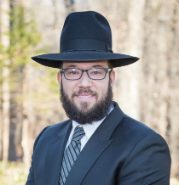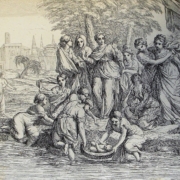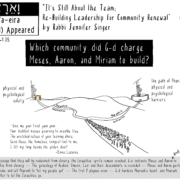Graceful Forgiveness / Graceful Masculinity – Mishpatim
 Part of a periodic Torah series on graceful masculinity and Jewish values.
Part of a periodic Torah series on graceful masculinity and Jewish values.
וְאֵלֶּה, הַמִּשְׁפָּטִים, אֲשֶׁר תָּשִׂים, לִפְנֵיהֶם.
And these are the judgments that you shall place before them. (Exodus 21:1)
When we ask G-d for forgiveness, in our daily prayers, we bless G-d as “the gracious One who pardons abundantly”. The Zera Kodesh explains our need for that “abundance” because even when we apologize to G-d for our mistakes, and regret them, we are limited in our understanding of the impact of our actions. Because we cannot fathom the full extent of our wrongs, we cannot adequately appreciate what we are asking for when we beg forgiveness.
The Zera Kodesh offers a parable of a simple villager who breaks an ornate window belonging to the king. Not having any understanding of the exorbitant value of the broken window, the villager brings an inferior one to the king as a replacement when asking for forgiveness. The king, being compassionate and gracious, accepts the apology and the window, but then shows the villager the process of collecting and adding the precious stones and the exquisite artisanal embellishments required to return the window to its original state. Only then does the villager understand how much damage he really did and just how forgiving the king was in accepting the inadequate restitution.
This is true in our human relationships as well. It is almost impossible to ever really understand the true depth of hurt and damage we cause another. Even when someone lets us know that our actions caused them pain, often our first reaction is to want to minimize our role to avoid taking full responsibility. It is perhaps for this reason that the Mishna (Bava Kama 9b), when teaching about damages, deviates from the standard third person language. Instead it uses the first person, to center the text in one’s ownership of one’s impact:
כל שחבתי בשמירתו הכשרתי את נזקו הכשרתי במקצת נזקו חבתי בתשלומי נזקו כהכשר כל נזקו
Anything that I am obligated to safeguard, I am responsible if it becomes damaged. If I facilitated part of the damage it caused, I am liable for payments of restitution for damage it caused, as if I were the one who facilitated the entire damage it caused.
Parshas Mishpatim opens with G-d telling Moses to “place [the laws] before them”. Rashi explains that G-d was teaching Moses that when it comes to these laws, it is not enough just to teach and review until people have memorized them, but you must go further and expound on the reasons and explanations until it is clearly presented before them.
The Talmud, Eruvin 54b, asks:
כֵּיצַד סֵדֶר מִשְׁנָה?
“How was the teaching organized’?’
The Talmud explains that Moshe taught it four times, and this teaches that students need repetition and need to learn new material four times. Rav Nosson Gestetner explains that the four times is understood as a reference to Pardes, פרדס, the four levels at which the Torah can be understood. The Mishna is the P’shat – פשט, the simple teaching. The other 3 levels in Pardes (Sod – סוד, the hidden secrets, Drash – דרש, homiletics, Remez – רמז) all allude to the סדר, order.
An essential aspect of understanding the laws of damages is recognizing how deep and profound the effect of our actions can be. In other words: it’s not enough to simply teach commandments so that people understand the way to behave. We need to impart with clarity a sense of responsibility and ownership for the hidden, and often traumatic, impact of our actions.
The word “judgment” – הַמִּשְׁפָּטִים, is understood by the Baal Haturim, the author of the Tur, the precursor to the Code of Jewish Law, as an acronym: הדיין מצווה שיעשה פשרה טרם יעשה משפט – “the adjudicator is obligated to make a compromise before issuing a judgment.” When two people are in conflict, and both feel entitled to something, they should each first try and share their experience with the other. When we ask someone for forgiveness, we may be asking them to compromise, to give something up.
Forgiveness can also allows for a reconciliation that brings people closer together, perhaps even closer than they were before. The Vilna Gaon understands the word rachamim (mercy) as the tool for forgiveness, and chein (grace) as the transformation of a negative act into a positive one. The blessing for forgiveness asks G-d to “Return us in complete repentance before you,” understood by the Nefesh HaChaim as “out of love”. Saying that we are sorry doesn’t undo what happened. But if we can approach apology from a heart-space, with a deep commitment to understanding how we negatively impacted another, the apology can go a long way to heal the pain of the past and build healthier relationships in the future.
Discussion questions:
What are some things to think about before we ask for forgiveness?
How can we make sure we focus on the other and not make it about us?
If our apology isn’t immediately accepted, how should we respond?
Why do we find it so hard to take responsibility for our mistakes?

By R. Mike Moskowitz.









